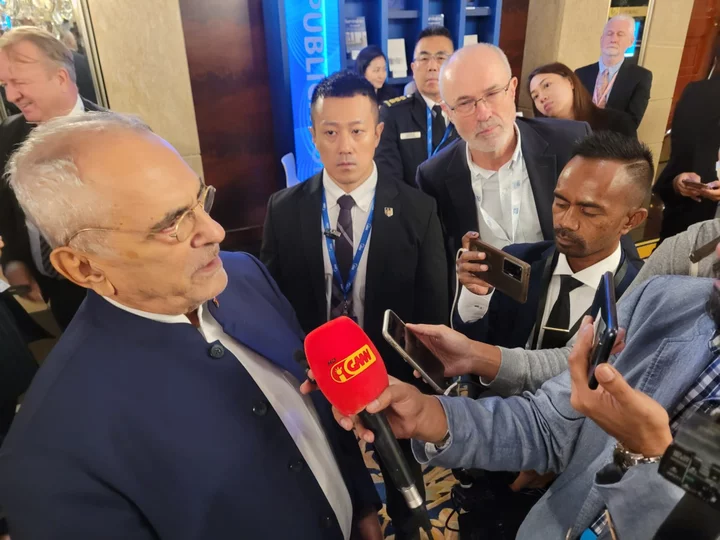Defense chiefs from around the world gathered in Singapore for Asia’s largest security forum to discuss major threats as tensions rise between the US and China.
The first two days of the Shangri-La Dialogue, which brings together more than 600 military leaders, policy makers and analysts from 40 nations, focused on US-China tensions and the war in Ukraine.
Pentagon chief Lloyd Austin and his Chinese counterpart, Li Shangfu, shook hands on the opening night of the conference but there have been few signs of a thaw between the world’s two biggest economies. As Austin spoke on Saturday, the US and Canadian navies sailed ships through the Taiwan Strait, an act Beijing considers confrontational.
In the most dramatic moment of the conference on Saturday, Indonesia’s defense minister pleaded for a peace proposal he offered to help end Russia’s war in Ukraine. But Ukraine’s defense minister rebuffed the offer, which would leave Moscow’s forces locked in place on Ukrainian territory, saying it sounded like a Russian proposal.
Latest coverage
- China Defense Minister Slams US, Vows to Defend Interests
- US Chides China Over Defense Talks as Navy Sails Taiwan Strait
- Indonesia Defends Ukraine Peace Plan, Says Asia Knows War’s Cost
- China’s Close Plane Encounter Shows Need to Talk, Blinken Says
- US Hits Roadblock in Bid to Renew China Ties: Its Own Sanctions
(All times local)
Nobel Winner Calls for US-China Engagement (10:01 a.m.)
Jose Ramos-Horta, the Nobel Peace Prize winner and president of East Timor, called on the US and China to “re-engage at some level” in order to “help keep the peace on the Korean peninsula.”
“I agree that strategic competition is inevitable,” Ramos-Horta said during a panel discussion. But he insisted that a US-China partnership “should outweigh differences in other areas of competition and rivalry between the two superpowers to help peace in the region.”
China Defense Minister Takes Aim at US (8:45 a.m.)
In a keynote address Sunday morning, Defense Minister Li said he sees a world that is “far from tranquil” and dominated by a “resurgent Cold War mentality.”
Without ever specifically citing the US, Li criticized “bullying” and “hegemony” that he said should never be allowed to take root in the Asia Pacific region. And he referred to the “so-called rules-based order” that he said was selectively applied.
China is committed to upholding peace in places like the Middle East and Ukraine, he said. Meanwhile “some country is expanding military bases, reinforcing military presence and intensifying” an arms race. He said tensions are increasing in the Indo-Pacific as a result of efforts to create a NATO-like alliance system in the region, a frequent criticism Beijing has about US strategy in the region.
Reznikov’s Pointed Remark on Russia’s War (6:36 p.m.)
Ukraine Defense Minister Oleksii Reznikov ended one of the final panels on Saturday with a pointed remark about China’s influence over Russia that was aimed at former Chinese Ambassador to the US Cui Tiankai, who was seated next to him.
Reznikov said he believed there was a new understanding between Russia and China after President Xi Jinping visited Moscow earlier this year, with Beijing becoming the “older brother” in the relationship between the two nations.
“Could you say to your younger brother to stop killing Ukrainians,” Reznikov said in his concluding remarks.
Former China Envoy Criticizes US and Europe (5:20 p.m.)
Former envoy to the US Cui Tiankai criticized Europe’s mismanagement of its own security situation, urging it instead to learn from Asia. “The best thing you can do for us is to do nothing,” Cui said, addressing Europe and America.
“We should also learn something very important something from your lack of success” in managing the security situation, he said. “We don’t need an Asian NATO.”
China has long sympathized with Russia’s reasons for invading Ukraine, particularly to push back against NATO, while opposing the war itself. The US has repeatedly said it’s not looking to create a version of NATO in Asia, even as it strengthens alliances to deter China from taking Taiwan and other disputed territory by force.
--With assistance from Rebecca Choong Wilkins, Peter Martin, Alfred Cang, Xiao Zibang and Jamie Tarabay.
Author: Philip J. Heijmans

